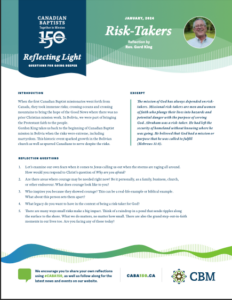thank you very much for this challenge. Can you translate to spanish and I wil do to quechua to continue mobilizing our churches to the mission of God?
The mission of God has always depended on risk-takers. Missional risk-takers are men and women of faith who plunge their lives into hazards and potential danger with the purpose of serving God. Abraham was a risk-taker. He had left the security of homeland without knowing where he was going. He believed that God had a mission or purpose that he was called to fulfill (Hebrews 11:8).
Aristotle scaled the virtue of courage between two vices. On one side was cowardice. On the opposite side was rashness. Faithfulness in mission attempts to avoid these vices and overcome the fears that restrain action. However, the line between risk and rashness can be hard to define. In 1994, my seminary colleague, Joao Matwawana, entered refugee camps in the Congo. He urged Rwandan pastors to lead services of confession and repentance for the sins of the genocide. The pastors were hesitant because génocidaires ran the camps. But Joao promised the pastors: “If they kill you, I will die with you.”
The New Testament bears witness to women and men of courage who were risk-takers. St. Paul wrote to the Christian community in Rome that he planned to visit them. But Rome would only be a staging point from which to take the gospel message to Spain. The mission of the church is not for the faint of heart. There is no room on the battlefield for cowards. The theme of courage is implicit in his exhortation to Timothy to be a good soldier of Christ Jesus who bears suffering in discharging his mission.
The theme of risk-taking is embedded in the famous saying of William Carey (1761-1834) as he urged British Baptists to establish an international mission movement: “Expect great things from God; attempt great things for God.”
I, myself, am a veteran of mission service in Bolivia. Our work was grounded in stories of risk-takers I would like to share two of them.
Archibald Reekie
Archibald Reekie, a Canadian Baptist, was the first foreign missionary to live and serve in Bolivia. Reekie was a student at McMaster Seminary. He served two student pastorates in Southern Manitoba in the late 1800s. His call seems to have emerged out of the reading of the gospels, prayer, and research into Latin America. Reekie was convinced that Bolivia was the only South American country without a permanent protestant witness. He risked an exploratory trip in 1896 that required over a month of travel in each direction. The experiences in La Paz and around Lake Titicaca further fueled his passions.
Reekie faced two great obstacles. The first was that Bolivian law prohibited any church other than Roman Catholicism. The legal penalty for protestant evangelism was death. The second was that the Canadian Baptist mission board was running a financial deficit because of commitments in India. Reekie would risk his life. Canadian Baptists would risk their finances.
Reekie arrived in Bolivia for the second time in 1898. His strategy was to begin with educational work. He settled in the city of Oruro. Within a year, there were worship services in a classroom. Over the next two decades, Reekie endured hardships, health problems, and opposition. He welcomed other Canadian Baptist missionaries who joined the mission in La Paz and Cochabamba. He married while on furlough in Canada, but his wife struggled with health issues in the altitude of Bolivia and was unable to remain in the country.
“There is the courage of leaving our locations of security to enter a space where we feel uncomfortable and out of place. It takes courage to cross cultural borders and barriers within our own communities.”
Reekie should never be glorified as a well-rounded saint. He could be blunt and demanding. When the mission board approved opening work in Bolivia, Reekie responded that he would have gone even without their support. He could be stubborn and inflexible with colleagues who had different ideas. He did not take direction well from the mission board in Canada and his reports were sketchy and infrequent. Reekie exemplified the independent nature and dogged determination of many pioneer missionaries of his time who were risk-takers.
I stand in awe at the courage of Archibald Reekie. He risked his life and his health over a period of twenty-four years. His brave response to God’s call paved the way for those of us who came after him.
Martyrs in Merk’Amaya, Bolivia.
The death of the eight martyrs of Merk’Amaya in 1949 and the response in both Bolivia and Canada is another narrative of courage. Norman Dabbs was an outstanding young leader who had served as a pastor in Ontario. He and Lorna took a risk to say “yes” to God’s call to Bolivia that came through Earl Merrick (a Bolivian missionary). The Dabbs family moved to Oruro, Bolivia in 1940. He was instrumental in the construction of the church, Cristo Resucitado, near the central square of that city. In 1949, Dabbs was winding down in Oruro and about to take on the challenge of leadership in the new seminary in Cochabamba.
Norman Dabbs traveled to the mining town of Merk’Amaya with three Bolivian friends: pastor Carlos Meneses, Francisco Salazar (president of the Bolivian Baptist Union), and the driver Luis Guerrero. Their intention was to hold an evangelistic service with local believers in a public area. What they did not know was that a plot to break up the meeting had taken shape the previous evening. The gathering of about 40 Baptists was attacked by an estimated 300 drunken people. The visitors and four church members from the town were killed with stones and wooden cudgels. Three homes were burned.
The Baptist congregation in Oruro held an all-night service waiting for the broken bodies to be transported to the church. During those hours, many people made courageous commitments to dedicate their lives to God in new ways. One of the young men in the church was my friend, Jaime Goytia. He had intended to participate in the trip to Merk’Amaya but arrived at the church after the truck departed. At the time, Jaime was considering a career in law or the military. That night, waiting for the bodies, he made the decision to enter the Christian ministry. Jaime Goytia went on to become the first director of the Bolivian Bible Society and the first Bolivian to be executive director of the Bible Societies of the Americas. In retirement, Jaime became the beloved rector of the Seminary in Cochabamba.
The death of the martyrs also had an impact in Canada. There was a movement in churches toward a deeper commitment to God. David and Jean Phillips took the risk to answer God’s call to take the place of Norman and Lorna Dabbs in Bolivia. They arrived carrying the Bible of Norman Dabbs that had been gifted to them.
Jaime Goytia frequently quoted the gospel saying: “Unless a kernel of wheat falls to the ground and dies it remains a single seed. But if it dies, it produces fruit.” (John 12:24) It takes courage to risk your life for the gospel. Mission entails risks. The memory of the eight martyrs of Merk’Amaya still has the capacity to call a new generation of young leaders to embrace their places in God’s mission with courage and with faith.
Going Deeper: Reflections with Gord King
The five questions in the Reflecting Light: Risk-Takers download are further expounded upon as Gord takes us deeper into how risk-taking can affect us individually, as a church, and as a community.
I am drawn to the gospel story of Jesus and his followers crossing the lake from Galilee to the Decapolis region. A sudden violent storm threatened to sink the small boat. Readers are familiar with the narrative. Jesus calmed the storm. He then asked his companions: Why are you afraid? The question is strange because the answer is obvious. A deeper reading asks us to consider the virtue of courage and the overcoming of fear in our commitment to God’s mission in the world.
- Let’s examine our own fears when it comes to Jesus calling us out when the storms are raging all around. How would you respond to Christ’s question of Why are you afraid?
The mission of the church, local and global, is built on risk-taking. Thankfully, not all of us face physical persecution and threats of violence. But courage is broader than standing up to a mob or before government authorities who violate the right to religious freedom. Courage takes different shapes depending on the context.
There is the courage of leaving our locations of security to enter a space where we feel uncomfortable and out of place. It takes courage to cross cultural borders and barriers within our own communities.
- Are there areas where courage may be needed right now? Be it personally, as a family, business, church, or other endeavour. What does courage look like to you?
Christian service in the community may require courage. We confront the individualism and destructive patterns of our age. We encourage people to believe that there can be new beginnings in which they break free of past behaviours. Risk-taking is required to face human issues like social housing, family violence, climate change, and food insecurity. Sometimes the positions and actions that we take will be controversial and opposed by parties that resist change.
It takes courage to speak for God and about God in a secular society. I think of adolescents and young adults who wish to bear witness to their generation that can be cynical about faith.
It can be risky to volunteer time to serve people who have been pushed aside or mistreated. The hidden wounds lie just under the surface and may be expressed in ways that are disturbing or frightening.
It takes courage to make a budget for programs that bear witness to God’s love and presence in the world. A stretched budget may seem foolish and be criticized as a financial risk.
Finally, it takes courage to recognize our own failures and limitations in serving God. We offer our passions and skills while recognizing that we are “the crooked timber” that God uses to build his presence in the world. We need the support, grace, and encouragement of other brothers and sisters so that we may serve with dedication and courage. We also need models of risk-taking that come from our sisters and brothers around the world.
- Who inspires you because they showed courage? This can be a real-life example or biblical example. What about this person sets them apart?
CBM’s 150th Anniversary is an appropriate time to reflect on the virtue of courage and the challenge of risk-taking in the mission of the church.
- What legacy do you want to leave in the context of being a risk-taker for God?
- There are many ways small risks make a big impact. Think of a raindrop in a pond that sends ripples along the surface to the shore. What we do matters, no matter how small. There are also the grand step-out-in-faith moments in our lives too. Are you facing any of those today?
Share your Reflection
Submit your own thoughts as we Reflect Light on our past and explore all the possibilities of our future as Christ leads us.



